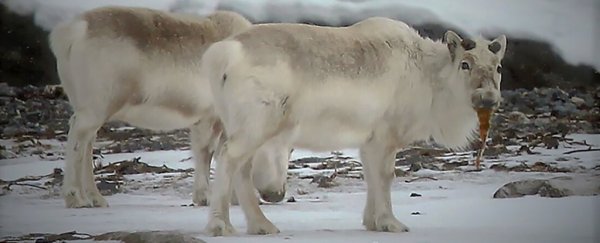For the northernmost herbivores on Earth, foraging for food has never been easy. Bound to the icy tundras of an Arctic archipelago, the wild Svalbard reindeers of Norway (Rangifer tarandus platyrhynchus) are accustomed to sparse vegetation.
But what they are dealing with now is far beyond that. With global warming causing more rain and less snow, their usual winter pastures have become trapped under ice. And to avoid starvation, many of these creatures have resorted to seaweed.
In one particularly bad winter, local researchers counted no less than a third of the archipelago's 20,000 reindeer feeding on the shore.
"It seems they can't sustain themselves on seaweed," says lead author Brage Bremset Hansen, a biologist from the Norwegian University of Science and Technology who has been studying this subspecies for decades.
"They do move back and forth between the shore and the few ice-free vegetation patches every day, so it is obvious that they have to combine it with normal food, whatever they can find."
Marooned on an island, without an ice corridor for escape (that, too, has melted), Hansen and his colleagues have watched the Svalbard reindeer grow ever more desperate.
Rather than trying to paw through an impenetrable wall of ice or dig through an exceptionally deep pile of snow, many reindeer are turning to seaweed.
This is a less-than-ideal supplement, and an absolute last resort. While the salty snack does provide a few extra calories, the researchers say it often gives the reindeer diarrhoea.
As such, it's a rarity that traditional Sami reindeer herders only report during poor winter feeding conditions. And recently, those are occurring at a much higher frequency.
The Arctic region is currently warming three times faster than the rest of the world, and as the northern skies dump rain instead of snow, the icy tundra becomes difficult, if not impossible for the reindeer to penetrate.
The good news is that these reindeer are adapting. The bad news is that the planet is moving faster.
A couple years ago, a study found that the average weight of adult reindeer on Svalbard had fallen from 55kg (121lb) to 48kg (106lb) in the 1990s, mostly as a consequence of global warming and charging Arctic landscapes. That's roughly 20kg less than they should ideally be.
What little these reindeer had then; how much less they must have now.
This study has been published in Ecosphere.
